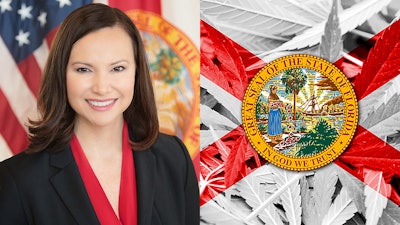
A constitutional amendment to legalize adult-use cannabis in Florida via the 2024 election is now under judicial review, but the state’s chief legal officer is attempting to keep it off the ballot.
Florida Attorney General Ashley Moody submitted Smart & Safe Florida’s citizen-led petition to the state’s Supreme Court on May 15, where, like other ballot initiatives, it must now survive the test of single-subject requirements and whether the ballot language is clear and unambiguous.
Florida Secretary of State Cord Byrd approved the initiative petition for judicial review April 6 (based on collection of at least one-quarter of the necessary valid signatures). And while Moody officially petitioned the Supreme Court Monday to opine on the petition’s validity, she signaled that she will be providing follow-up reasoning behind her position to keep it off the 2024 ballot.
“I believe that the proposed amendment fails to meet the requirements of Section 101.161(1), Fla. Stat., and will present additional argument through briefing at the appropriate time,” Moody wrote to the Supreme Court justices, suggesting that the ballot language does not comply with state law.
Moody’s written remarks came five days after Florida-based Trulieve, the largest operator in the state with 125 dispensaries, claimed Smart & Safe Florida had gathered the 891,523 signatures necessary to appear on the 2024 ballot. But, as of May 16, the Florida Division of Elections website had yet to update the petition’s current valid signature count of 786,747.
While David Bellamy, of the Bellamy Brothers music duo, chairs the Smart & Safe Florida political action committee, Trulieve represents the primary financial muscle behind the campaign with $38.5 million in contributions so far, according to the Florida Department of State.
None of Florida’s other 21 medical cannabis licensees have contributed money as of April 2023’s campaign contributions reporting period.
“As of early May, the [Smart & Safe Florida] campaign has gathered sufficient raw signatures for inclusion on the November 2024 ballot,” Trulieve CEO Kim Rivers said May 10 in a public statement. “With 22 million residents and 138 million annual tourist visits, we believe Florida will be a top legal cannabis market, reaching $6 billion in annual revenue.”
Through 2022, only California has recorded close to $6 billion in annual retail sales from licensed dispensaries. A state of roughly 39 million, California reported nearly $5.8 billion in adult-use sales in 2021 and $5.3 billion in 2022, according to its Department of Tax and Fee Administration.
Florida’s medical cannabis program, which sold roughly 267,000 pounds of flower at retail in 2022, now includes more than 817,000 patients, according to the state’s Office of Medical Marijuana Use. But the Sunshine State has a long road ahead to rival the likes of California.
While Smart & Safe Florida advocates have argued the simplicity of their initiative offers a path to the 2024 ballot, rejection from the state’s Supreme Court justices remains a threat. Most recently, the justices ruled in 5-2 decisions that a pair of previous attempts to legalize adult-use cannabis were misleading to voters and not sufficient to appear on the November 2022 ballot.
RELATED: Florida’s High Court Says No to Cannabis Ballot Proposal, Again
Although Moody has opined since taking office in 2019 that various attempts to legalize adult-use cannabis have been insufficient—and has indicated she will do so again—other law experts have said the current initiative is different.
Florida’s failed cannabis initiatives of the past were drafted in a way to try and avoid the state Legislature from stepping in and writing laws that deviate from a measure’s intent, said Zachary Kobrin, partner at Florida-based Akerman LLP.
Kobrin previously worked as vice president and general counsel at Trulieve. Before that, he worked as general counsel and chief compliance officer for Cansortium Holdings (now Fluent).
“This time around, there was a lot of thought put into how to simplify the process to pass Supreme Court review, which every ballot initiative has to have, but then also to basically just make it as simple as possible [to implement],” he said. “Effectively saying, ‘Yep, adult use has passed, and the existing MMTCs (the operators) can sell adult use recreationally.’ So, effectively saying, ‘Legislature, we’re just saying it’s legal: You implement regulation fixing it.’”
To Kobrin’s point, there’s nothing in the 2024 adult-use ballot initiative’s language about requiring licensees to be vertically integrated from seed to sale, a provision that applies to current Medical Marijuana Treatment Centers (MMTCs). There’s nothing about licensing caps or a licensing structure. There’s nothing about wholesaling between MMTCs or future adult-use operators. And there’s nothing written for a social equity program, social justice initiatives or home cultivation.
RELATED: Florida’s 2024 Cannabis Ballot Measure’s Secret is Simplicity
Key provisions of the proposed 2024 constitutional amendment include the following:
- MMTCs and other licensed entities are allowed to acquire, cultivate, process, manufacture, sell, and distribute cannabis products and cannabis accessories to adults 21 and older for personal use;
- Adults and licensed operators shall not be subject to criminal or civil liability or sanctions under Florida law;
- An individual’s possession of cannabis for personal use shall not exceed 3 ounces of dried flower or 5 grams of concentrate;
- The state Legislature may provide for the licensure of non-MMTC entities to participate in the industry, and nothing prohibits the Legislature from enacting laws that are consistent with the amendment; and
- The effective date of the amendment is six months after approval by the voters.
The effective date is key, because there’s a provision in Florida’s 2017 medical cannabis law that essentially sunsets the entirety of Florida’s medical cannabis program within six months of that date, Kobrin said. In other words, according to the legislative intent of the 2017 law, lawmakers and state regulators would have six months from the effective date to get a program in place or medical cannabis operations would be put on halt.
“The Legislature has six months to adopt an entirely new regulatory framework, either continuing the existing medical program and building out the new rec program or whatever it would be,” Kobrin said. “If the Legislature doesn’t act within six months, the whole program ‘technically’ goes away.”
Before Florida crosses that bridge, the proposal must survive judicial review. Then, 60% of voters would have to support the initiative at the polls for the measure to pass—a supermajority requirement for constitutional amendments that was adopted in 2006 in the Sunshine State.
And although legalization advocates have said the 2024 ballot measure’s secret is in its simplicity, opponents are eying the ballot summary, which includes provisions to: 1.) Allow adults 21 years and older to purchases, possess and use cannabis; 2.) Allow MMTCs and other licensed entities to operate in the program; and 3.) Establish possession limits for personal use.
Cannabis proposals in other states, like South Dakota and Nebraska, failed judicial reviews in their respective supreme courts for language that did not stand up to the single-subject test.
But if Florida’s justices provide the OK, Kobrin said he’s confident voters would favor legalization.
“If a company’s willing to put [$38.5] million in, I would think that a lot of that money is going towards public support for the program,” he said. “I definitely think if it gets on the ballot, it passes.”


























